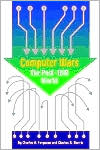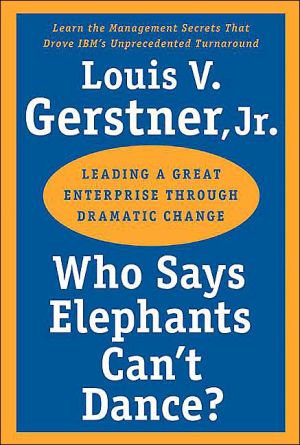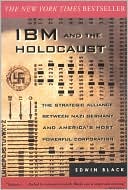Computer Wars: How the West Can Win in a Post-IBM World
Reveals how the leading computer firms in both the U.S. & Japan lost golden opportunities to dominate the industry & how the battle is being waged successfully today by smaller companies like Microsoft & Intel. The cautiously optimistic message is that American market share in most critical areas has stabilized & that Western firms now have the opportunity to take back the lead — but not without new government policies & new company strategies. A masterful overview of the...
Search in google:
Two business writers and consultants chronicle IBM's rise to computer industry dominance in the 1970s through its decline in the early 1990s when this book was first published. Examining implications at the time for computer companies entering a period of vast opportunity and international competition, the chapters include the rise of the clones, competing in radically decentralized systems, and toward an American technology policy. Annotation (c)2003 Book News, Inc., Portland, OR Publishers Weekly Reading more like a consultant's report than a popular narrative, this densely written analysis suggests that small, maverick companies, rather than giants, have the best chance to lead the computer business. At first, Morris ( The Coming Global Boom ) and computer consultant Ferguson draw on anonymous, inside sources to chronicle the decline of IBM, blaming mainly the corporation's managers but also trade barriers raised by both the U.S. and Japan. Then the authors look more broadly at the industry. Noting America's edge in innovation and software, and Asian advantages in manufacturing, they suggest that the battle will be over ``architectures''--the standards that define computer networks--and explore business strategies to control those standards. Only in the final chapters do Ferguson and Morris address industrial policy: they propose a ``pro-technology policy agenda'' that supports basic research and intervenes to prevent other countries from establishing cartels over crucial components. Even more important to industrial growth, the authors note, is a reordering of federal spending in areas such as health care. Author tour. (Feb.)
AcknowledgmentsIntroductionPt. IThe Fall of IBM1Coloring the World Blue32Guerrilla Warfare173The Roots of Decline304The Rise of the Clones515Revenge of the Nerds666Picking Through the Shards84Pt. IIWinning in a Post-IBM World7Three Contenders1018Competing in Radically Decentralized Systems1159Winning: The Basic Argument12710Locking In a Winning Position14511Life Cycle Strategies15912Management Strategies in High Technology170Pt. IIIProspects and Opportunities13The Next Decade's Market Opportunity19114The Future of Computer Companies20515Government and Computers: Prologue to Policy22316Toward an American Technology Policy240Further Reading259Index263
\ Publishers Weekly - Publisher's Weekly\ Reading more like a consultant's report than a popular narrative, this densely written analysis suggests that small, maverick companies, rather than giants, have the best chance to lead the computer business. At first, Morris ( The Coming Global Boom ) and computer consultant Ferguson draw on anonymous, inside sources to chronicle the decline of IBM, blaming mainly the corporation's managers but also trade barriers raised by both the U.S. and Japan. Then the authors look more broadly at the industry. Noting America's edge in innovation and software, and Asian advantages in manufacturing, they suggest that the battle will be over ``architectures''--the standards that define computer networks--and explore business strategies to control those standards. Only in the final chapters do Ferguson and Morris address industrial policy: they propose a ``pro-technology policy agenda'' that supports basic research and intervenes to prevent other countries from establishing cartels over crucial components. Even more important to industrial growth, the authors note, is a reordering of federal spending in areas such as health care. Author tour. (Feb.)\ \ \ \ \ Library JournalFerguson, a computer analyst, and Morris, an economist, paint a cautiously optimistic picture of America's potential to reclaim its leading market share in the area of technology. They begin by chronicling IBM's rise to dominance in the industry and its dramatically accelerating decline. Next, they analyze the ingenuity and strategies of smaller American companies that constitute the force necessary to win the computer wars without IBM; they delineate the essential rules for future success. Finally, the authors outline political implications and emerging opportunities for Western firms in consumer electronics. Other topics of discussion: the impact of government policy, the prospects and problems facing companies, and the effect of the computer wars on every citizen. A superb blueprint that will intrigue an informed audience.-- Joe Accardi, Northeastern Illinois Univ. Lib., Chicago\ \








